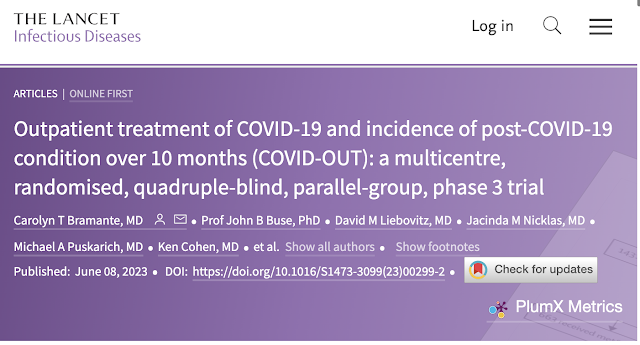Use of metformin in adults with diabetes linked to lower risk of long COVID: An EHR-Based Cohort Study From the RECOVER Program
What
Adults who use the prescription drug metformin to treat their type 2 diabetes have a lower risk of developing long COVID or dying after a COVID-19 infection than people with diabetes who take other anti-diabetes medications, according to a large study supported by the National Institutes of Health (NIH). The findings, published in the journal Diabetes Care, were based on health data from millions of U.S. patients and could have broader implications for use of metformin in long COVID prevention generally. The study is part of the NIH-funded Researching COVID to Enhance Recovery (NIH RECOVER) Initiative(link is external).
The researchers compared health records from 75,996 adults taking metformin for their type 2 diabetes to 13,336 records from patients who were not taking metformin but were using other types of diabetes medicines. Researchers were specifically looking at how many patients either died or were diagnosed with long COVID within six months after infection. They found that patients taking metformin had a 13% to 21% lower incidence of long COVID or death than those in the non-metformin group.
Scientists are not clear how metformin may prevent long COVID, but they speculate the possibility of several mechanisms that reduce inflammation, decrease viral levels, and suppress the formation of disease-related proteins.
Metformin can have side effects and should be used with caution in some conditions. For these and other reasons, people should not take the drug unless prescribed by a doctor.
Long COVID is marked by a wide range of symptoms – including chronic fatigue, brain fog, and chest pain – that vary from person to person and can last for weeks, months, or years after infection from SARS-CoV-2, the virus that causes COVID-19. While rates of new cases have decreased since early in the COVID-19 pandemic, millions of people are still living with it.
This study was supported by NIH under agreement number OT2HL161847 as part of the RECOVER research program. Additional support came from grant K23 DK124654; UM1TR004406; OT2HL16184701; R01 AG056479; UM1TR004406; P30DK124723; and UM1TR004528. For more information on RECOVER, visit https://recovercovid.org.
Who
David C. Goff, M.D., Ph.D., director of the Division of Cardiovascular Sciences at the NIH’s National Heart, Lung, and Blood Institute and lead epidemiologist for RECOVER, is available for interviews on this paper.
Study
Johnson SG, Abedian S, Stürmer T, et al. Prevalent Metformin Use in Adults with Diabetes and the Incidence of Long Covid: An EHR-based Cohort Study from the RECOVER Program [2024] Diabetes Care. DOI: 10.2337/dca24-0032
About RECOVER: The National Institutes of Health Researching COVID to Enhance Recovery (NIH RECOVER) Initiative brings together clinicians, scientists, caregivers, patients, and community members to understand, diagnose, and treat long COVID. RECOVER has created one of the largest and most diverse groups of Long COVID study participants in the world. In addition, RECOVER clinical trials are testing potential interventions across five symptom focus areas. For more information, please visit recoverCOVID.org.
HHS Long COVID Coordination: This work is a part of the National Research Action Plan (PDF, 1.3 MB), a broader government-wide effort in response to the Presidential Memorandum directing the Secretary for the Department of Health and Human Services to mount a full and effective response to Long COVID. Led by Assistant Secretary for Health Admiral Rachel Levine, the Plan and its companion Services and Supports for Longer-term Impacts of COVID-19 report (PDF, 1.6 MB) lay the groundwork to advance progress in the prevention, diagnosis, treatment, and provision of services for individuals experiencing Long COVID.
About the National Institutes of Health (NIH): NIH, the nation's medical research agency, includes 27 Institutes and Centers and is a component of the U.S. Department of Health and Human Services. NIH is the primary federal agency conducting and supporting basic, clinical, and translational medical research, and is investigating the causes, treatments, and cures for both common and rare diseases. For more information about NIH and its programs, visit www.nih.gov.






.png)

Comments
Post a Comment